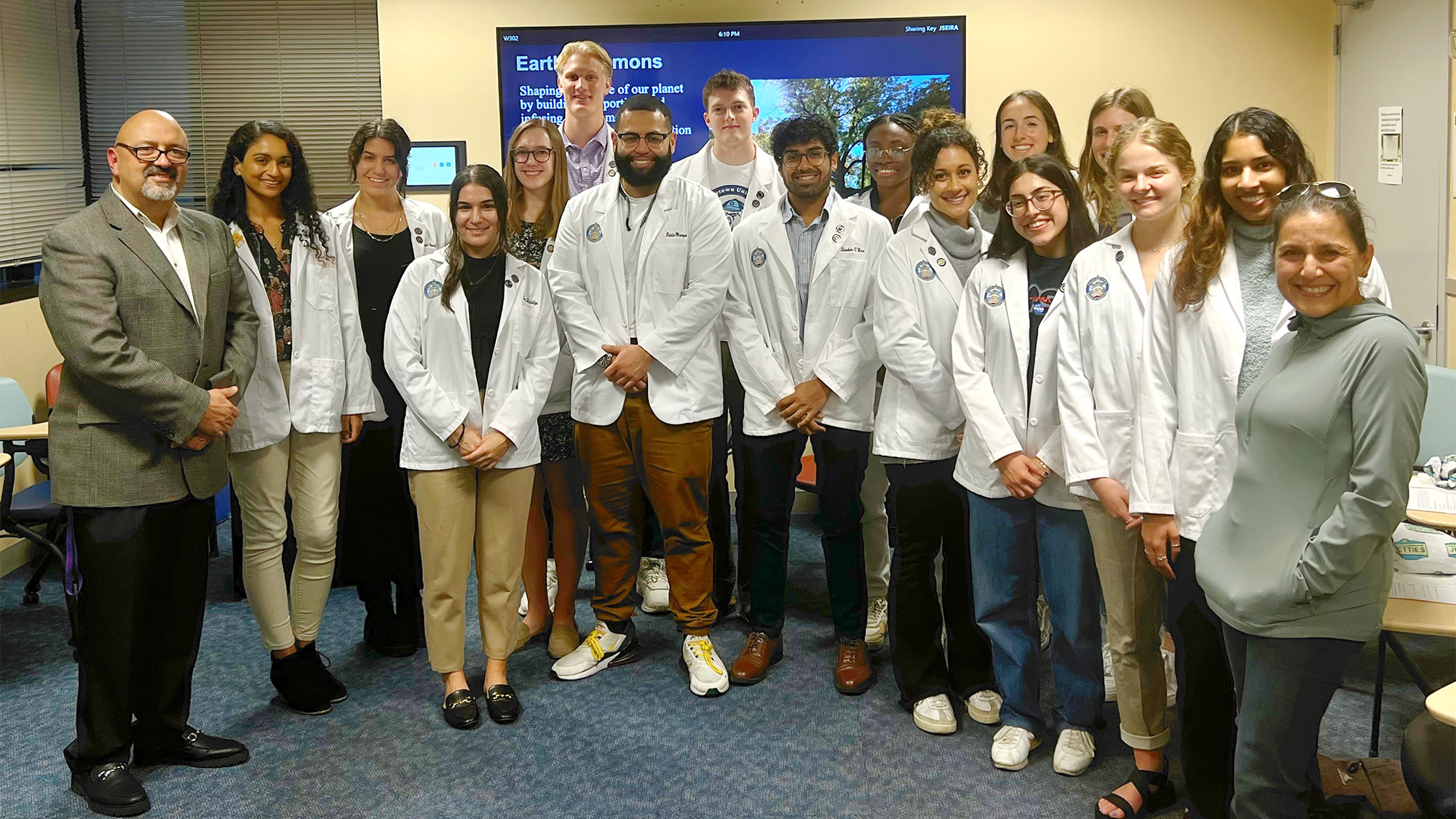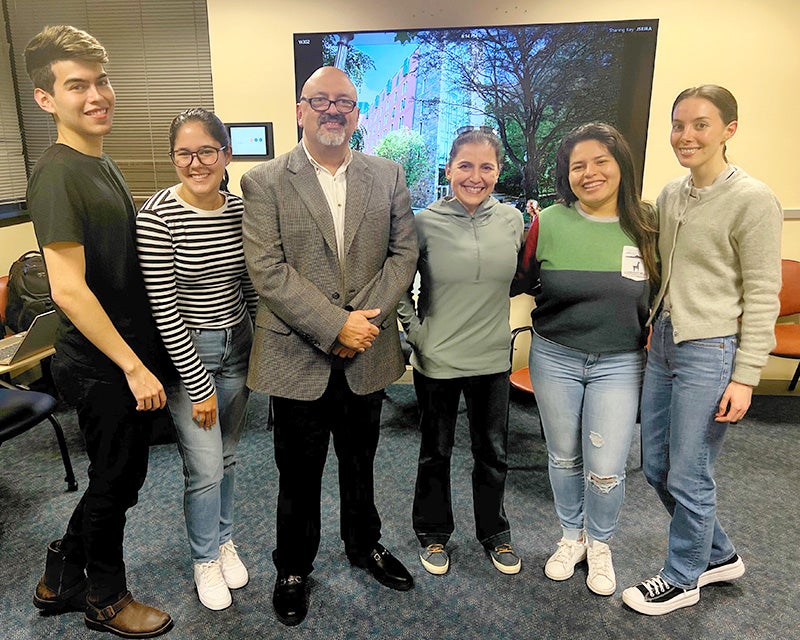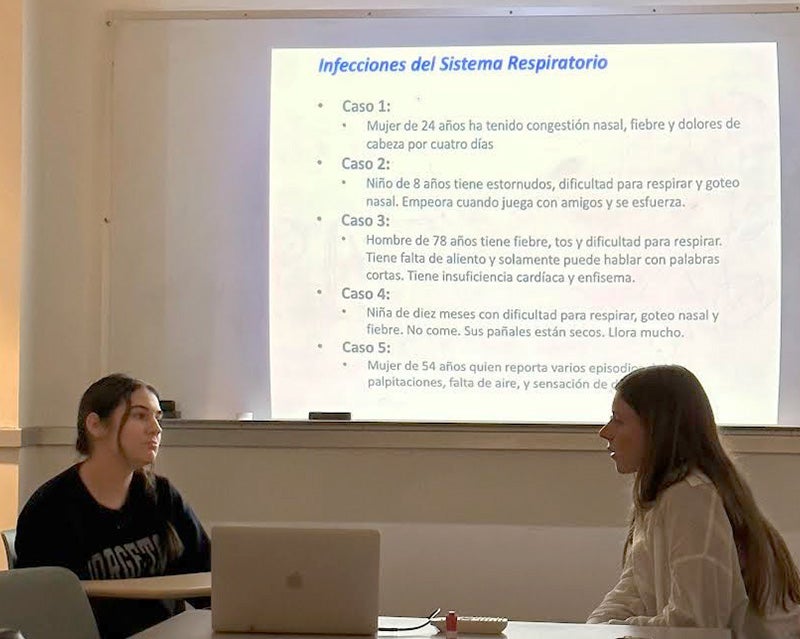Medical Students Form Organization to Increase the Number of Spanish-Speaking Physicians

Posted in News Stories | Tagged cultural competence, cura personalis, medical education, Medical Spanish Initiative, student experience
(September 1, 2023) — With a dual mission to train medical students to effectively communicate and educate the School of Medicine community about the specific health needs of the Latino population, a group of third- and fourth-year medical students are looking to recruit the next cohort of leaders for the Medical Spanish Initiative (MSI).
“If one medical student learns medical Spanish, that means thousands more patients will be reached in the community in the future and be able to have that direct communication with their physician, which is so important,” said David Perez (M’26), who is part of MSI’s leadership.
Perez said an informal survey revealed that 74 medical students, almost one-third of the incoming class, expressed interest in joining MSI.
The idea for the initiative originated with a group of students four years ago. Even those who speak Spanish conversationally must learn the language’s medical terminology.
“The idea for the group came from the fact that the Hispanic population is one of the fastest-growing populations, especially in the Washington, DC, area,” said Gonzalez Calvo (M’25). “There aren’t many physicians who are fluent in medical Spanish, in part because they did not receive training in medical school, so our goal is to provide the training so medical students are confident and competent Spanish-speaking physicians in the future.”
Creating a Curriculum

The leadership of MSI developed a medical Spanish curriculum for first-year medical students mirroring their lesson block topics. “If the first-year students are on their gastrointestinal block, our medical Spanish curriculum will match that and include workshops on topics such as the abdominal exam,” said Constanza Menendez Alurralde (M’25).
“We have two or three meetings per block and a consistent group of students who attend,” said Marelyn Perez-Badillo (M’26). The group is advised by Olga Rodriguez, MD, PhD, associate professor in the School of Medicine, and Luis Ricardo Henríquez, MD, a local practicing pediatrician and neonatologist. The advisors help facilitate sessions with the medical students and provide a wide range of knowledge of different colloquialisms for medical terminology used by Spanish speakers.
“We try to include as many different words for ailments as possible, because this varies depending on what country you are from,” Gonzalez Calvo explained. “For example, you may refer to a headache as either ‘dolor de cabeza’ or ‘jaqueca,’”
The group’s ultimate goal is to have medical Spanish be a four-year curriculum track available to all medical students. Recently, MSI successfully added medical Spanish as a selective for second-year medical students. The group also secured a partnership with the Arlington Free Clinic to provide opportunities for first- and second-year medical students to practice their skills in a clinical setting.
Cultural Competency Workshops For Everyone
In addition to the medical Spanish training sessions, MSI also holds cultural competency workshops throughout the school year.
“In the cultural competency workshops, we explore the impact of culture and socioeconomic factors on disease prevalence within the Spanish-speaking communities,” said Menendez Alurralde. “The content of the workshops is also tied to the second-year curriculum on topics such as nutrition and cardiovascular diseases.”
MSI encourages all interested students to attend the cultural competency workshops, which regularly draw 40 or more participants. However, the medical Spanish training sessions are limited to students with at least an intermediate proficiency in Spanish, a much smaller pool of about a dozen students from every class.
“While we would love to accept everyone and continue to explore ways to do that, we found that students with an intermediary knowledge of Spanish or higher benefit the most by being able to take in all of the medical information and being able to put it into practice,” said Gonzalez Calvo. “You need to be able to carry out a regular conversation with a Spanish-speaking person and obtain basic knowledge before adding more medicine-specific vocabulary.”
Community Impact

Several MSI members emphasized the importance of physicians speaking directly with patients and not through an interpreter.
“Medical interpreters are super useful and a good resource when a physician doesn’t speak Spanish, but the connection created when you can directly speak to your patient is unparalleled,” said Perez, who previously worked as a medical interpreter before starting medical school. “When I was working as an interpreter, the patients would assume I had medical knowledge and would share very personal and intimate details that they were not directly sharing with the physician.
“The patient should trust you as the physician and feel comfortable with you,” he said. “The physician being able to speak Spanish goes a long way in communicating that you understand where the patient is coming from.”
Bonding with a patient through a shared language is a sentiment many involved with MSI share.
“Speaking Spanish goes a long way in building rapport with Hispanic and Latino patients who already face so many structural barriers in accessing health care,” said Perez-Badillo. “I’m so impressed by my peers who don’t have a Spanish-speaking background and make the effort to really have that connection with patients.”
“Speaking Spanish directly with the patient also helps you explain medical information to the patient,” said Gonzalez Calvo. “But beyond medical information, the physician is also able to communicate empathy and human connection when patients feel the most vulnerable.”
In addition to building a cohort of Spanish-speaking physicians with the course, MSI is also focused on serving the health needs of the Spanish-speaking community within the DC area through their recently created partnership with the Arlington Free Clinic.
“The Arlington Free Clinic provides care to underserved populations, and 60-80% of their patients are Spanish-speaking,” said Gonzalez Calvo. “We are partnering with them to help our community by giving medical students the opportunity to exercise the skills they learn in our workshops.”
“It’s amazing to see when a patient notices you speak the same language,” said Daniela Hernandez (M’26). “Their eyes just light up.”
Heather Wilpone-Welborn
GUMC Communications
